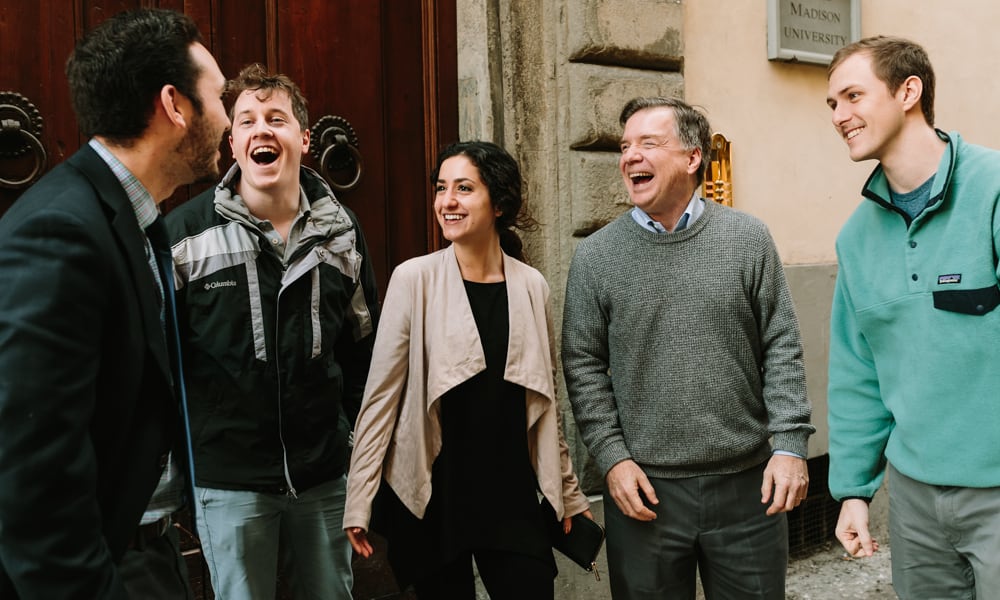Letter from the Director
M.A. in Political Science, European Union Policy Studies
EUPS Director Dr. Charles Blake with students in Florence pre-COVID-19
Dear EUPS Alumni and Friends,
The COVID-19 pandemic has highlighted the importance of the decisions made by individuals, of the interactions between societies and their respective governments, and of the cooperation (or lack thereof) among governments around the world. The past year has tested our ability – both individually and collectively – to coordinate our actions in search of health, prosperity, and the pursuit of happiness.
While our shared interest to emerge from the global pandemic is clearly urgent and decidedly important, building consensus is not easy. The level of international cooperation seen in 2009 at the outbreak of H1N1 (or “swine flu”), for example, was not present in 2020 as the world struggled to deal with the novel coronavirus. The productive lines of communication and cooperation among the United States, the European Union, the People’s Republic of China, and the Russian Federation that had proven so valuable in 2009 were incomplete or absent in 2020. A decline in transatlantic cooperation has come to the forefront in the fitful international response to COVID-19.
Though the world has struggled lately to build common solutions, there is renewed hope for collaboration in a post-Covid world. “We have a once-in-a-generation opportunity to design a new transatlantic agenda for global cooperation – based on our common values, interests and global influence. This should be the linchpin of a new global alliance of like-minded partners,” said Ursula von der Leyen, President of the European Commission, in her recent presentation of a joint EU-US global agenda.
It is in this spirit that the EUPS program has just entered a grant-funded team to implement Project TRACK-STAR. The two year project will facilitate transatlantic policy dialogues among U.S. and European civil society organizations regarding economic and environmental policy and democratic governance. We are excited about the opportunity for students to gain hands-on experience in the pursuit of policy innovation at the domestic and international levels. In a separate story within this newsletter, Christina Craver speaks in more detail about the project and our students’ role in it.
The EUPS program has always stressed two things. First, we prepare students to contribute to policy making as an information-based enterprise that is inherently political because it involves collective decision-making. Second, and simultaneously, we help students to develop cross-cultural skills through experiences that highlight the commonalities and distinctions between the European Union and the United States – both in terms of societal and governmental dynamics. This combination of skills is vital for our alumni focused on transatlantic affairs but also for those focused on policy and politics at the local, national, or international levels from anywhere in the world. George Vergara’s story in this issue provides an example of the relevance of such skills in the workplace and in the service of the public interest.
The core audience for this newsletter is a combination of program alumni, current students and their families, prospective students, and other program allies and stakeholders. All of you have reached out in various ways to me and to our faculty and staff to ask questions about how we are holding up amid the challenges of the pandemic. On behalf of our entire team, I want to thank you for your interest in both our personal well-being and in the success of the EUPS program.
Simply put, I am pleased to report that we have managed to generate productive responses that permit us to continue our operations now and into the future. We welcomed the Class of 2021 to Florence in fall 2020 and students safely completed the first semester.
In response to the predicted winter surge in caseloads in the Northern Hemisphere, we began the spring 2021 semester with a series of online meetings with EU officials and career development and professional networking workshops. Morgan Raymond’s piece shares her experiences meeting virtually with policy practitioners.
Classes have begun online in mid-January and will resume in person in March 2021. All indicators thus far align with our plans to operate in Florence from March through students’ graduation in late June 2021. This year’s cohort of students is also preparing to step into their roles in support of the transatlantic policy dialogues that will begin programming with a keynote address in late March from an EU official. In turn, this year’s spring symposium will take place early in the summer session and will focus on policy roundtable discussions among graduate students from our program, from Italy, and from Kosovo.
As I write this, we are currently fielding applications and inquiries from the prospective students of the Class of 2022. If you, as our faithful supporters and readers, also receive inquiries, please know that the program is authorized to run in Florence during the upcoming 2021-2022 and we see indications that conditions will continue to improve with regard to the pandemic. We will follow local, Italian, US-based, and global guidance on how to keep our students, faculty, and staff healthy – and we are invested in finding ways to preserve and expand our program’s emphasis on placing students in contact with European- and US-based policy practitioners.
Has the year 2020 been challenging? Certainly.
Have our faculty, staff, and students risen to meet those challenges? Absolutely.
How do we feel about 2021? Optimistic: for all the reasons discussed in this newsletter.
Cordiali saluti,
Charles Blake
